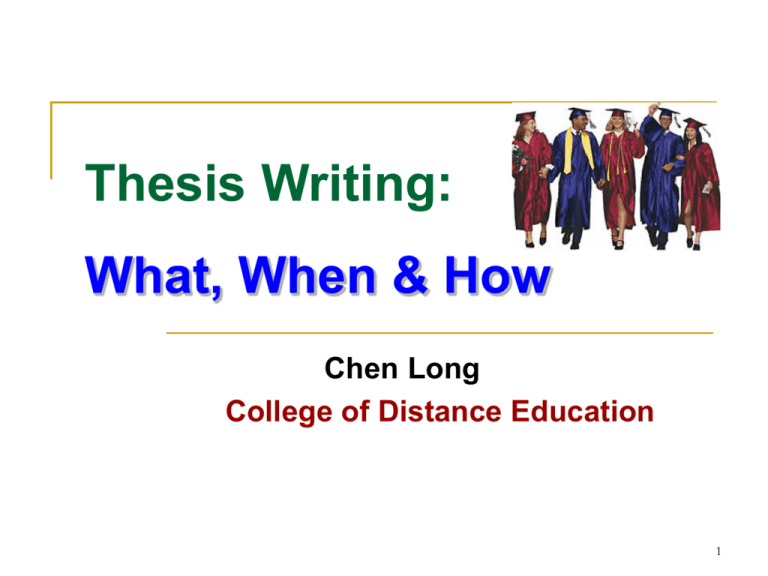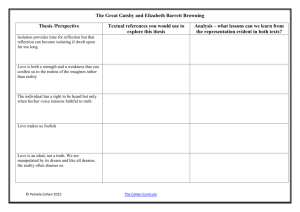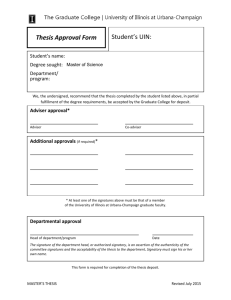参考书目格式 - 上海外国语大学网络学院
advertisement

Thesis Writing: What, When & How Chen Long College of Distance Education 1 Outline What (Subject matter & format) When (Timetable) How (Length & style requirements) 2 Thesis Writing What (subject matter): ◆ Literature ◆ Linguistics ◆ Culture ◆ Teaching method ◆ Translation ◆ Job-related (with advisor’s approval) How (length): about 5000 words or 15 ~18 pages (text only) 3 When – Timetable (General) Writing Duration: 3-1~10: orientation – 2 themes - advisor 3-11~18: meeting with advisor – proposal 3-19~4-22: first written draft – revision comment 4-23~5-20: final thesis – grading & comment End of May: if thesis approved, oral defense 4 Timetable (Specific) 3-1~3-10: - orientation and 2 Themes - assignment of adviser 3-11~18: - meet with adviser (Print-out with signature) - discuss Proposal - upon approval, start first draft 3-19~4-22: - submit first written draft & “Pledge of Originality” - (e-)submit 1st written draft to advisor for comment 5 Timetable (continued) 4-23~5-20: final thesis - write and revise thesis (at least 2 face-to-face meetings with adviser) - Adviser’s Comment - If approved, - finalize thesis & submit 3 copies for oral defense End of May: - Ooral defense: 3-teacher panel; minimum 2 approvals to pass Beginning of May: submit & bound official version of thesis (check for ALL REQUIREMENTS) 6 Guidelines “Get the job done.” General vs. Specific “A-single-bookism” Reference books Avoid plagiarism Citation guidelines 7 General vs. Specific On Modern American Literature - Realism as Reflected in A’s Novel Name - A Study of the Main Characters in … A Comparison between Chinese and Western Cultures - A Comparison between Greetings/Apologies as Applied by Chinese and Westerners How to Translate Advertisement English into Chinese - A Tentative Analysis of Translating Brand Names and Their Ad Slogans into Chinese 8 “A-single-bookism” “A-single-bookism” Original works - read through at least 2~3 times - familiarize yourself with author, plot, background, characters, etc. 5 References 9 What to focus? Language proficiency & consistency - Grammar: tense, subject-verb agreement - Spelling, punctuation & capitalization - Choice of words & collocation Structure Format & style Individual effort & avoid plagiarism 10 Plagiarism What is plagiarism? - taking or using other’s ideas, comments, findings, theories, etc. in your writing without acknowledging the source or the author What is its consequence? - one-vote-out – no oral defense or 2nd chance What to watch for? - 1/5 direct quotes; 1/3 cumulative references 11 How to Avoid Plagiarism “Pledge of Originality” Reading, understanding & paraphrasing Acknowledging the source of quote Writing in Chinese – translating into English – revising English version Web resource: 防止出现剽窃的26条指南 http://check.cnki.net/Article/standard/avoid/Index.html Avoiding Cut and Paste Plagiarism with Citations http://tlt.its.psu.edu/suggestions/cyberplag/cyberplagexamples.html 12 Format and Requirements of Thesis Paper 13 Sample Format (Single-book-based) Introduction (why this paper; what the paper is about) (2~3 pp.) Text components: (10~13 pp.) - Synopsis of the novel, characters, etc. - Introduction to the author - Background of the novel, story, etc. - Analysis of main characters & their relationship Conclusion (restatement of theme) (1~2 pp.) References (1 p. at least 5) 14 Sample Outlines Who Killed Gatsby? -- A Tentative Analysis of the Death of Gatsby I. Introduction (3~4 pages) 1.1 Fitzgerald and The Great Gatsby 1.2 The decline of the American dream in the 1920s 1.2 The plot II. Analysis of Gatsby (2~4 pages) 2.1 His ambition 2.2 His unrealistic love for Daisy 2.3 His lavish life and parties 15 The Great Gatsby (cont’d) III. The causes of Gatsby’s death (3~4 pages) 3.1 Daisy Buchanan 3.2 Tom Buchanan 3.3 George Wilson 3.4 The role of Nick Carraway IV. The moral lesson of The Great Gatsby (2~3 pages) V. Conclusion (1~2 pages) Gatsby is killed by the social norm and his unrealistic dream of reunion of Daisy’s love. References 16 A Comparison between American and Chinese Family Education I. Introduction (2~3 pages) 1.1 Define “family education” 1.2 Trends in family education in America and China II. A comparison of FE in America & China (7~8 pages) 2.1 Aims of family education 2.1.1 Independence vs. dependence 2.1.2 Interests & processes vs. academic performance & results 2.2 Learning strategies 2.2.1 Learning by exploring vs. rote learning with correct answer 2.2.2 Encourage creation, innovation vs. imitation 2.2.3 Teaming vs. self-based 17 A Comparison between American and Chinese Family Education (cont’d) 2.3 Feedback 2.3.1 Parents’ role and expectation in family education 2.3.2 Positive vs. negative 2.3.3 Encouraging vs. comparing and perfecting 2.4 Physical and psychological development 2.4.1 Healthy, enjoying sports vs. fragile, lacking exercises 2.4.2 More open-minded, optimistic vs. more reserved, under pressure 2.4.3 Easygoing vs. less sociable III. Suggestions for improvement (2~3 pages) IV. Conclusion (1~2 pages) While American families stress an allround personality development, Chinese families strive for academic excellence in their children's family education. 18 How: Style & Requirement 上海外国语大学网络教育学院 学士学位论文撰写规定 - 打印格式 - 装订格式 - 参考书目格式 - 相关表格 19 参考书目格式:English (APA) Books Journals Online Resources APA Citation Guideline: http://wenku.baidu.com/view/fd8f653610661ed9ad51f 3a7.html 20 English Books Single author: Brown, H. D. (2001). Teaching by principles: An interactive approach to language pedagogy (2nd ed.). White Plains, NY: Addison Wesley Longman, Inc. …inside the text (Brown, 2001). “…for writing purpose” (Brown, 2001, p.18). Co- or Three-authors: Smith, D., Boyd, R., & Spoher, J. C. (1995). Virtues VRKL toolkit. Indianapolis: Hayden Books. …inside the text (Smith, Boyd & Spoher, 1995). 21 English Books Multiple-authors: Ligon, M., Carpenter, K., Brown, W., & Milsop, A. (1983). Computers in the world of business communications. Hartford, CT: Capital Press. …inside the text: 1st time (Ligon, Carpenter, Brown & Milsop, 1983). …inside the text: 2nd time (Ligon, et al., 1983). Editor: Higgins, J. (Ed.). (1988). Psychology. New York: Norton. Benyon, J., & Mackay, H. (Eds.). (1993). Computer into classroom. London: The Falmer Press. 22 Articles From Books or Journals: Barlett, L. (1990). Teacher development through reflective teaching. In J. Richards & D. Nunan (Eds.), Second language teacher education. Cambridge: Cambridge University Press. Murzynski, J., & Degelman, D. (1996). Body language of women and judgments of vulnerability to sexual assault. Journal of Applied Social Psychology, 26(3), 1617-1626. “…inside the text” (Barlett, 1996, pp.201-202). Online: Degelman, D., & Harris, M. L. (2000). APA style essentials. Retrieved from: http://www.vanguard.edu/faculty/ddegelman/index.cfm?doc_id=796 Nielsen, M. E. (n.d.). Notable people in psychology of religion. Retrieved from: http://www.psywww.com/psyrelig/psyrelpr.htm …inside the text (Nielsen, n.d.). 23 参考书目格式:中文 书籍 罗常培:《语言与文化》,北京:商务印书馆,1957。 …inside the text (Luo, 1957). 南国农:《电化教育学》(第二版),北京:高等教育 出版社,2000。 束定芳、庄智象:《现代外语教学-理论、实践与方 法》, 上海:上海外语教育出版社,1996。 … inside the text (Shu & Zhuang, 1996). 王士元主编:《语言与人类交际》,广西:广西教育出 版社,1987。 [美] A. N. 乔姆斯基著,徐烈炯等译:《乔姆斯基语言 哲学文选》,北京:商务印书馆,1992。 24 参考书目格式:杂志文章 杂志 张占一、毕计万:“如何理解和揭示对外汉 语教学中的文化因素”,《语言教学与研 究》,1991第四期:27-35。 …inside the text (Zhang & Bi, 1991, p.28). 25 During Oral Defense Briefly tell what you paper is about (2~3 min.) Three judges, three questions Be concise but to the point Define the terms clearly and accurately No reference is allowed to your thesis 26 Word of Caution Choose a familiar and tangible subject Read original Novel at least 2~3 times Work out a schedule & stick to it Following: Proposal > Outline > Draft > Adviser’s Consent > Revision > Adviser’s Approval Comment > Revision & Fine-tuning > Final Thesis > Oral Defense > Binding Use rewording & acknowledgement, not cut-andpaste Plagiarism – a Big NO-NO In References, list only what you’ve quoted in your thesis (at least 5 books or resources) 27 Thank You! Good Luck! 28






